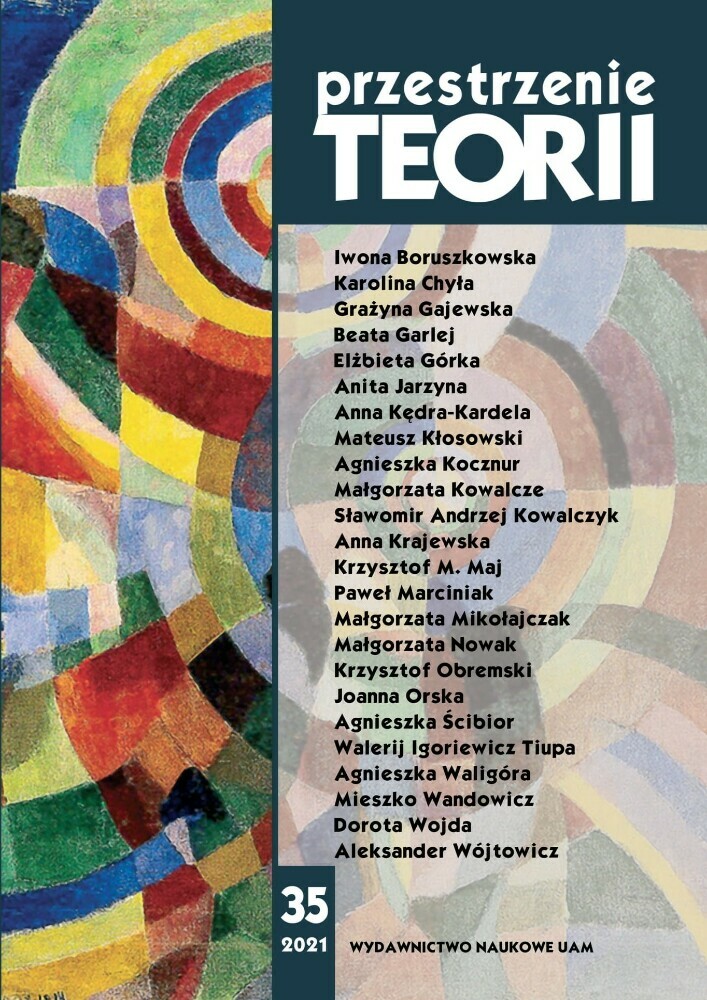Abstrakt
The starting point of the article is locating Joanna Bator in the Polish literary field using Pierre Bourdieu’s methodology, and considering such elements as gender determinants, the author’s attitude towards the media and self-creation, and the time of the prose’s debut. The Nike Prize Bator was awarded in 2013, and not only did enable this author to maintain autonomy in her field, but also led to a change in poetics, i.e. a change in the dominant genre of her novel from magical realism to fairy tale. The article describes the conditions that influenced the transfer of the author by critics from the current of high and award-winning literature to the prose of the medium.
Bibliografia
Antonik D., Autor jako marka: literatura w kulturze audiowizualnej społeczeństwa informacyjnego, Kraków 2014.
Barrie J.M., Piotruś Pan w Ogrodach Kensingtońskich, przeł. A. Wieczorkiewicz, Poznań 2018.
Bator J., Sulej K., Pokój z widokiem, [w:] Własny pokój, Virginia Woolf, przeł. A. Graff, Warszawa 2019.
Bourdieu P., Męska dominacja, przeł. L. Kopciewicz, Warszawa 2004.
Bourdieu P., Reguły sztuki, przeł. A. Zawadzki, Kraków 2001.
Chowaniec U., „Femme mélancolique”, czyli o pesymizmie najnowszej literatury kobiecej, [w:] Ćwiczenia z rozpaczy. Pesymizm w prozie polskiej po 1985 roku, red. J. Jarzębski, J. Momro, Kraków 2011.
English J.F., Ekonomia prestiżu, przeł. P. Czapliński, Ł. Zaremba, Warszawa 2013.
Gajewska A., Miłość w czasach patriarchatu. Proza feministyczna wobec konwencji romansu i melodramatu na przykładzie „Bambino” Ingi Iwasiów i „Piaskowej góry” Joanny Bator, [w:] Miłość we współczesnych tekstach kultury, red. M. Szczepaniak, Bydgoszcz 2010.
Jankowicz G. i in., Literatura polska po 1989 roku w świetle teorii Pierre’a Bourdieu. Raport z badań, Kraków 2014.
Kristeva J., Potęga obrzydzenia. Esej o wstręcie, przeł. M. Falski, Kraków 2007.
Lunnemann P., Jensen M.H., Jauffred L., Gender bias in Nobel Prizes, „Humanities & Social Sciences Communication” 2019, nr 5, <https://www.nature.com/articles/s41599-019-0256-3> [dostęp: 30.04.2021].
Riviere J., Womanliness as a masquerade, „The International Journal of Psychoanalysis” 1929, nr 10, s. 303–313.
Świerkosz M., W przestrzeniach tradycji. Proza Izabeli Filipiak i Olgi Tokarczuk w sporach o literaturę, kanon i feminizm, Warszawa 2014.
CYTOWANE WYWIADY I RECENZJE
Karaszewska Z., Stano S., Wizualna strona istnienia, [w:] Pod podszewką. Prawdziwy wizerunek pisarza, Warszawa 2018.
Kwaśniewski T., Joanna Bator. Jestem nienażyta, „Newsweek” 2013, 16–29.12, nr 51/52.
Marcysiak K., Kultowe rozmowy: Joanna Bator, <https://www.youtube.com/watch?v=3HY5GH8HAm8> [dostęp: 5.01.2019].
Nowacki D., Recenzja: „Piaskowa Góra” Joanny Bator, <http://wyborcza.pl/1,75517,6253476,Piaskowa_Gora__Bator__Joanna.html> [dostęp: 3.05.2019].
Pruszyński R., Poruszający wywiad z Joanną Bator. O życiu w Japonii, nieudanym związku i nagrodzie Nike, <https://polki.pl/zycie-gwiazd/newsy,poruszajacy-wywiad-z-joanna-bator,10036723,artykul.html> [dostęp: 16.04.2019].
Świątynia Nike. Wywiad z Joanną Bator, [w:] Rozmowy z autorami – lubimyczytac.pl, pod red. D. Warszawskiego, J. Janowicz, <https://issuu.com/lubimyczytac.pl/docs/rozmowy_z_autorami_-_lubimyczytac.p> [dostęp: 5.06.2019].
Wienias A., Interesuje mnie przede wszystkim opowiadanie ciekawych historii, <http://fraza.univ.rzeszow.pl/numer/85-Rozmowa-z-Joanna-Bator.php> [dostęp: 5.06.2019].
Winiarski J., Idealny sposób na kwietniową noc. Rozmowa z Joanną Bator, <http://www.literaturajestsexy.pl/idealny-sposob-na-kwietniowa-noc-rozmowa-z-joanna-bator/> [dostęp: 6.03.2019].
Wodecka D., Bator: Moje przykazania od III do X, <http://wyborcza.pl/magazyn/1,124059,12782963,Bator__Moje_przykazania_od_III_do_X.html> [dostęp: 14.07.2019]
Licencja
Autorzy
Autorzy tekstów przyjętych do publikacji w czasopiśmie „Przestrzeniach Teorii” są zobowiązani do wypełnienia, podpisania i odesłania na adres redakcji umowy o udzielenie nieodpłatnej licencji do utworów, z zobowiązaniem do udzielania sublicencji CC.
Zgodnie z umową, autorzy tekstów opublikowanych w czasopiśmie „Przestrzeniach Teorii” udzielają Uniwersytetowi im. Adama Mickiewicza w Poznaniu niewyłącznej i nieodpłatnej licencji oraz zezwalą na użycie sublicencji Creative Commons Attribution-NonCommercial-NoDerivatives 4.0 International (CC BY-NC-ND 4.0).
Autorzy zachowują prawa do dalszego, swobodnego rozporządzania utworem.
Autorzy, którzy wykorzystują w swoim tekście cudze utwory (np. ilustracje, fotografie) proszeni są o dostarczenie do redakcji czasopisma zgodę na publikację od uprawnionych podmiotów.
Użytkownicy
Zainteresowani użytkownicy internetu uprawnieni są do korzystania z utworów opublikowanych po 2015 roku „Przestrzeniach Teorii” tylko w calach niekomercyjnych, pod następującymi warunkami:
- uznanie autorstwa - obowiązek podania wraz z rozpowszechnionym utworem, informacji, o autorstwie, tytule, źródle (odnośniki do oryginalnego utworu, DOI) oraz samej licencji;
- bez tworzenia utworów zależnych - utwór musi być zachowany w oryginalnej postaci, nie można bez zgody twórcy rozpowszechniać np. tłumaczeń, opracowań.
Do wszystkich tekstów opublikowanych przed 2015 r. prawa autorskie są zastrzeżone.
Inne
Uniwersytet im. Adama Mickiewicza w Poznaniu zachowuje prawo do czasopisma jako całości (układ, forma graficzna, tytuł, projekt okładki, logo itp.).

